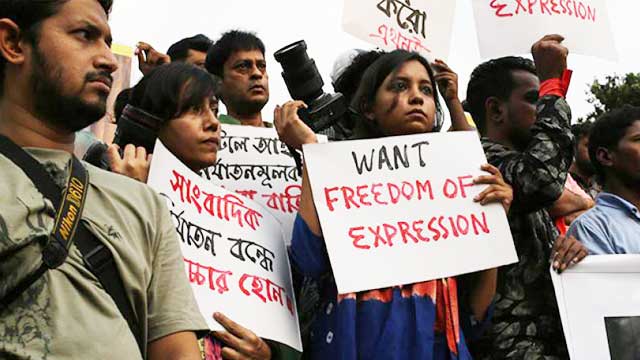The downward trend of the rule of law and freedom for the media go hand in hand with Bangladesh, and to impose various obstacles or censorship on the media translates to distrust of society, said experts.
In a situation like this, practicing true democracy becomes difficult, they added.
Journalists and communication experts made the observations addressing a virtual discussion on Monday, titled "Rights of information, freedom of expression and investigative journalism: Bangladesh aspect."
They said one will fail to find a country in today's age where democracy is absent but the media are free, and urged the government to amend the controversial Digital Security Act (DSA) 2018.
They also said the DSA is being used to control the voice of the country's free thinkers and journalists.
The government has been hiding information on corruption rather than curbing it, they added.
TIB Executive Director Iftekharuzzaman, speaking at the virtual discussion, said that creating barriers to the free flow of information is hampering the rule of law, prevention of corruption, and governance."
Stating that Bangladeshi media is not being able to do investigative journalism, eminent journalist and historian Prof Afsan Chowdhury, said: “The press now considers itself to be a sub-political force rather than the media. They rely on headlines instead of investigative journalism. Media workers now don’t try to succeed; they are not even ready, and their employers do not take initiatives to train media workers. If we can't get out of this, the media will never be free, nor will the media workers succeed in fulfilling their responsibilities."
Prof Dr Gitiara Nasreen, teacher at the department of mass communication and journalism of Dhaka University, said: "Most of the media are providing the same set of information. People don't think that journalists are on their side. If we can't get out of this trend by challenging the conventional structure, it will not be possible to build the confidence, trust, and hope of people in mass media."
At the end of the discussion, TIB announced the winners of Investigative Journalism Awards for this year.
The winners are: Foysol Islam, senior staff reporter at the daily Gramerkagoj, Jessore; Mohammad Selim, editor at the weekly Chatgarbani; Arifur Rahman, senior reporter at the daily Kaler Kanth; and Shafiq Shahin, special correspondent at NTV and the Searchlight program of Channel 24.
All of the reporters selected for the award will receive certificates, crests, and Tk125,000 as award money, while the TV program will get Tk150,000.
This year, TIB received 49 reports and documentaries in different categories for the award.
Prof Afsan Chowdhury, Prof Gitiara Nasreen, and eminent journalist Julfikar Ali Manik were the jury for this award.





